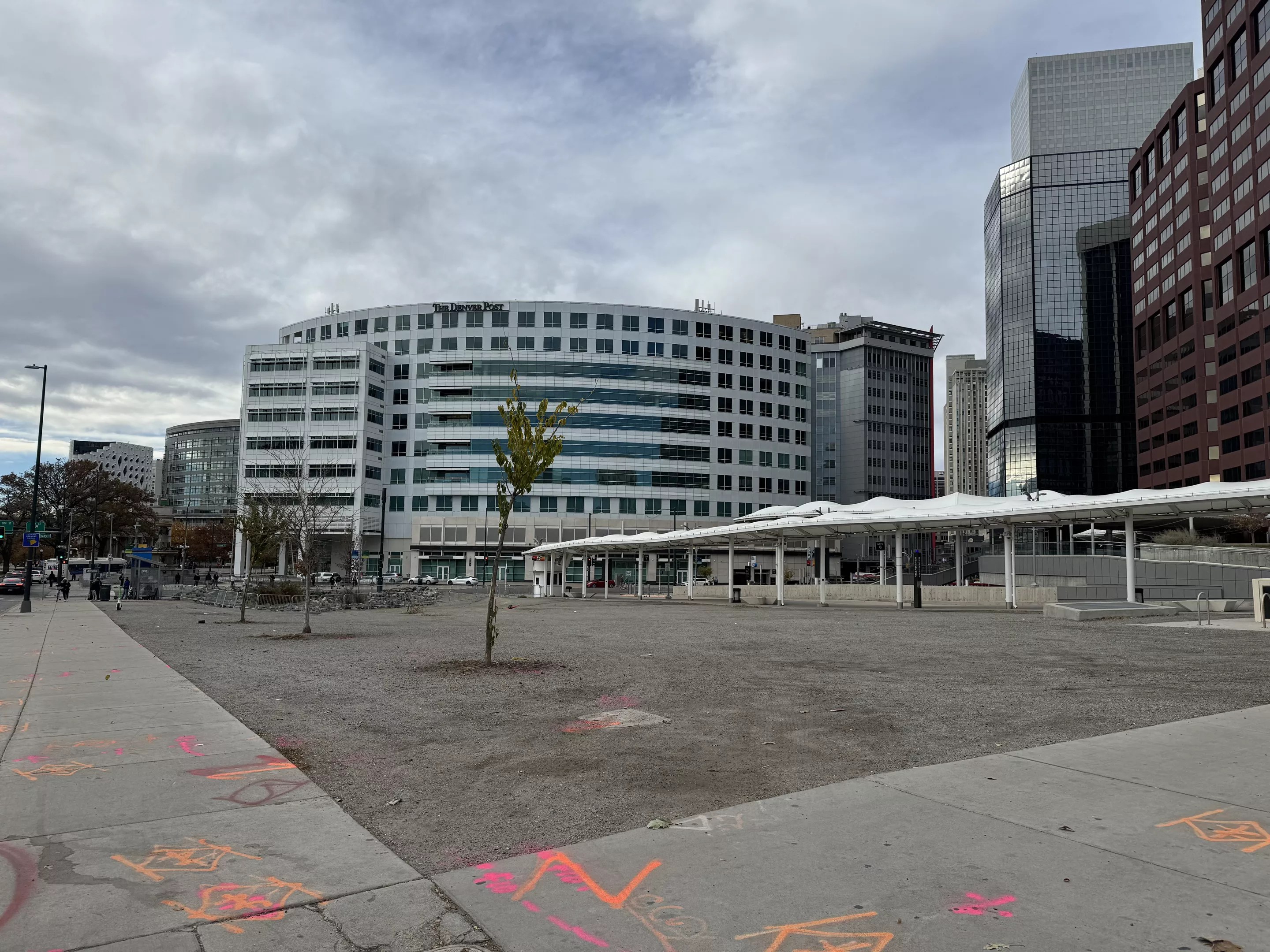
Catie Cheshire

Audio By Carbonatix
The idea of pickleball courts at the corner of Broadway and Colfax is no longer just a dream.
The City of Denver’s Division of Real Estate has officially sent out a request for expression of interest for an operator to build and maintain pickleball courts at one of the busiest intersections in Denver, where an empty gravel lot has sat for years.
A request for interest (RFI) lets the city know who might be capable of meeting the requirements to operate the project, which would begin after the city is done grading the land appropriately; the area is currently sloped in a way that isn’t conducive to courts for the popular game.
The empty gravel lot at the corner of Broadway and Colfax has long been a point of concern for the city, which has had to handle complaints about the vacant space attracting vagrants and crime. The lot is part of a larger parcel of land leased by RTD from the Cheesman Family Trust.
RTD uses much of the block for Civic Center Station, a public transit hub, and has plans to build more facilities there eventually, so any activation of the area would be temporary. According to the RFI, the initial term of the pickleball project would be five years with an option to renew for two more.
The city’s shortage of pickleball courts and noise that comes from the existing courts have been hot topics over the past few years. The RFI specifically notes that the “operator shall employ best practices to mitigate sound resulting from outdoor pickleball play.”
“We’re all familiar with some of the noise-related issues at pickleball courts, and we want to make sure that we are sensitive to that and doing everything we can to minimize nuisance noise,” says Evan Dreyer, deputy chief of staff for Mayor Mike Johnston. “If you go stand out there right now, it’s loud. It’s a busy intersection. There’s a lot of traffic in the hustle and bustle of the city, so that’s one of the reasons that this kind of a use at this location makes a lot of sense. There’s already ambient noise there.”
The Mayor’s office has been examining ways to make the lot safer over the last few years, Dreyer told Westword last November. The RFI explains how pickleball fits in with Johnston’s goals for the city, known as Vibrant Denver.
“Downtown Denver’s path forward requires strategic investment, policy innovation, and community collaboration,” the RFI states. “Now is the time for creative investment and public-private partnerships that embody the spirit of Downtown Denver as the epicenter of economic activity, culture, athletics and the place where community is celebrated, and everyone belongs.”
Denver is looking for a private partner to build and manage the courts because of the short-term nature of the project.
“This is not a city-owned site so that fact led our department of Parks and Recreation to feel like if it’s not a city owned site and this is kind ‘a temporary use’, even if it’s for up to seven years, the department still felt like it was probably better to bring in an outside operator,” Dreyer says.
An RFI is less formal than a Request for Proposal, so interested parties just need to submit a brief business proposal that includes the company’s history and vision for the site. After that, the city evaluates the responses and move to a targeted round of proposals.
Requirements include a full-time manager and an onsite employee during all open hours. The city wants the courts open every day (with the exception of holidays), with suggested hours of 5 a.m. to 10 p.m.
“We were thinking about the day-to-day life cycle of downtown,” Dreyer says of that suggestion.
That way, people could play before work, on the way to the office, during a lunch break or after work, according to Dryer.
“You can see after-hours park activity – basketball courts, tennis courts, pickleball courts – all around the city today,” he says. “It’s nice to be able to extend the operating hours beyond just a typical nine to five.”
The city could have a say in how much the operator charges to play at the courts and wants to keep costs low, but Dreyer notes that the goal is for any potential operator to recuperate their investment in court fees.
The courts would also be designed for security with fencing, gating, lighting and cameras.
“What we’re really focused on is how do we ensure that there’s not any vandalism or anything that takes place in the overnight hours when the courts are not being used?” Dreyer says, adding that the city is examining solutions for those potential problems now.
Responses for the request are due by June 23.